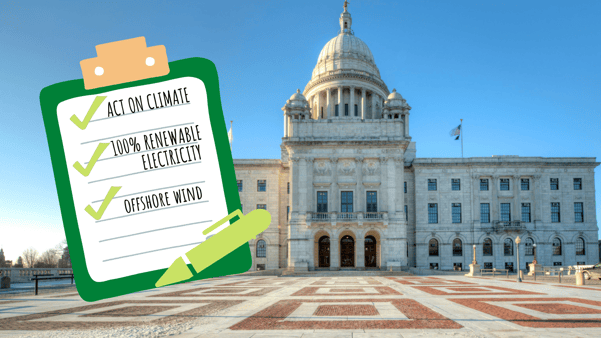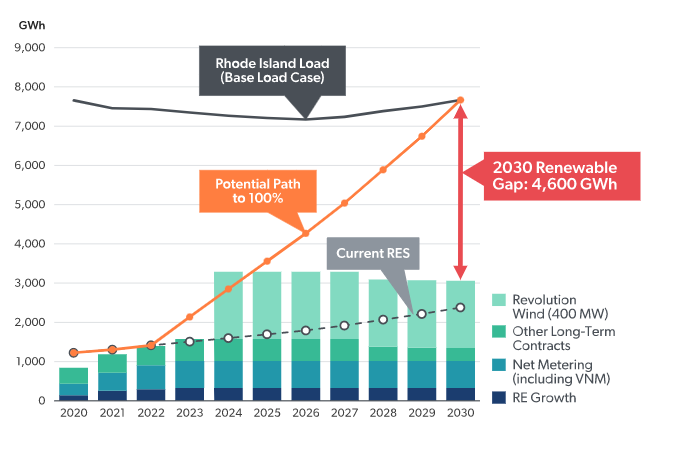 A note from Larry Chretien, Executive Director: This blog was written by Kai Salem and Mal Skowron as a wrap up of the super strong 2022 legislative session of the Rhode Island General Assembly. Kai is moving on from Green Energy Consumers to attend law school at Columbia University. There’s a huge need for energy lawyers who put people and the planet first. In her four years here, Kai made her mark as an energy advocate working in the public interest. We wish her the best and are thankful for what she accomplished.
A note from Larry Chretien, Executive Director: This blog was written by Kai Salem and Mal Skowron as a wrap up of the super strong 2022 legislative session of the Rhode Island General Assembly. Kai is moving on from Green Energy Consumers to attend law school at Columbia University. There’s a huge need for energy lawyers who put people and the planet first. In her four years here, Kai made her mark as an energy advocate working in the public interest. We wish her the best and are thankful for what she accomplished.
Rhode Island’s legislative session is over and wow—a lot happened. This session, the legislature considered more climate and environmental bills than ever before, which reflects the new urgency of meeting the Act on Climate goals. It also passed legislation that vaults Rhode Island to a position of national leadership when it comes to clean energy and climate action. Under the leadership of House Speaker Joe Shekarchi and Senate President Dominick Ruggerio, RI had one of its best legislative sessions on energy/environmental issues ever. Here’s a recap of what happened with (most of) the legislation that Green Energy Consumers supported.
Rhode Island leads the nation on electricity decarbonization
As you’ve no doubt heard by now, Rhode Island is now on track to be the first state to reach 100% renewable electricity with the passage of legislation that updates the Renewable Energy Standard to reach 100% by 2033. Thank you to Senate President Dominick Ruggerio and Representative Deb Ruggiero for sponsoring the bills, and to Governor Dan McKee, who supported the legislation and signed the bill into law on June 29th.
But how will we get to 100%? Offshore wind, which will be boosted by legislation sponsored by Senate Environment Chair Dawn Euer and Rep. Art Handy (in coordination with Governor McKee). Although a much smaller number than what we’re seeing in neighboring Massachusetts, 600 - 1000 megawatts will go a long way in Little Rhody: it is enough to get us almost all the way to the 100% goal with affordable clean energy developed in-state.

This figure above was created by the Brattle Group in January 2020 to assess pathways for Rhode Island to reach 100% renewable electricity. The clean energy bills passed this year will get us to 100% by 2033 (three years past what is pictured here) and add 600-1000 MW of offshore wind, putting the state in good position for getting to 100%.
In addition to requiring the procurement of a project, Sen. Euer ensured that the legislation requires environmental and labor standards and minimizes handling fees paid to the utility company, Rhode Island Energy.
Green Energy Consumers also worked hard to pass legislation that would have supported solar in RI, especially solar on rooftops and already-developed sites. We helped to develop consensus policy that would protect greenspace while expanding the Renewable Energy Growth solar incentive program, especially for solar on carports and schools. Although the legislation didn’t pass, we made important strides this session. Thanks to Rep. June Speakman for sponsoring and to the forest and energy advocates who drove this bill forward.
A phase-out of inefficient, mercury-filled lightbulbs passed the House. This is a testament to the advocacy of the lead sponsor, Rep. Art Handy. This is a win-win bill that follows up on last year’s successful passage of efficient appliance standards. It protects consumers’ pockets, reduces emissions, AND removes toxic mercury from our homes.
We also celebrated passage of bills to implement labor standards in renewable energy projects, a priority of the Climate Jobs RI coalition, of which we are a member.
 A step towards phasing out gasoline
A step towards phasing out gasoline
Clean electricity is the backbone to get carbon out of Rhode Island’s economy. Now policy must help make the shift from vehicles powered by burning fossil fuels to vehicles running on electricity. This year, we laid the groundwork to establish a pathway for Rhode Island to transition away from gasoline.
One of our top priorities was the Electric Transportation Act, a bill sponsored by Rep. Terri Cortvriend and Sen. Alana DiMario that established a goal to make 100% of new vehicle sales in Rhode Island electric in 2030. In addition to setting this goal, the bill listed a litany of supportive policies to prepare our electric grid for higher loads, lower the cost of electricity for charging EVs, and set a timeline for electrifying state-owned vehicles.
The Electric Transportation Act didn’t pass out of committee, but it did get hearings in both chambers. This was the bill’s first year being introduced, so we spent a lot of time educating policymakers about the fast-approaching wave of EVs and how to prepare the state’s infrastructure for them.
There were a few small wins related to transportation in the state budget: $1.25 million was allocated to re-establish the DRIVE EV state rebate program to help Rhode Islanders lower the cost of purchasing new and used electric vehicles. Sen. Meghan Kallman and Rep. Leonela Felix successfully added an effort to make the most popular public transit bus line in Rhode Island free for a year. We’re looking forward to seeing how both of these programs affect EV purchases and transit ridership in the next year.
and progress to Building Emissions Reductions
Our top priority when it comes to emissions reductions from buildings, Building Energy Reporting and Performance Standards, had a good House hearing led by Rep. Rebecca Kislak but ultimately did not pass. In a crowded slate of legislation related to reducing emissions from buildings and the natural gas system, Green Energy Consumers sees this is a foundational policy to addressing the complex issue of decarbonizing large buildings.
Legislation to update the Green Buildings Act (sponsored by Rep. Terri Cortvriend and Sen. Lou DiPalma) did pass both chambers: this slight update ratchets up the efficiency standards that public buildings are required to meet.
Green Energy Consumers also advocated for legislation that would remove the financial incentive driving the gas utility company to expand the gas system. This policy, known as gas decoupling was supported by the Public Utilities Commission, Chair Euer, Senate Commerce Chair Sue Sosnowski, and House Corporations Chair Joe Solomon; however, it only passed the Senate.
Unfortunately, the state budget failed to include incentives for building energy efficient, green schools or to ensure that the new housing built from state funding is zero-carbon. On the other hand, it does reserve $25 million for a new heat pump program housed at the Office of Energy Resources.
We also advocated for the General Assembly to eliminate a scoop of energy efficiency funds that was proposed in the original budget. Thanks in large part to Sen. Sam Zurier, the scoop was removed in the final budget.
We need to do better on environmental justice
Rep. Lauren Carson led passage of legislation to create an Environmental Justice Advisory Board for the state’s climate council. We do think that this board will lead to more equitable, just actions of the state. However, planning and input is not enough: we need real protections for environmental justice communities, and “environmental justice” needs to be defined in state law for the first time. The Senate passed Chair Euer’s Environmental Justice Act (first introduced and passed last year), which would have done just that, but the bill again languished in the House.
It wasn’t all good from the Senate, though: the Senate also passed Sen. Frank Lombardo’s legislation that would have allowed polluting, so-called “advanced-recycling” facilities in the state of Rhode Island, jumping over any oversight from the Department of Environmental Management (DEM). This would have contributed to unjust local pollution. Majority Leader Chris Blazejewski and Speaker Shekarchi helped stop this bill from coming to a vote in the House.
The FY23 Budget did include a big uptick in staff for DEM. We hope this is used to hire staff to develop new environmental justice programs for the state, in addition to an Act On Climate implementation coordinator.
What’s Next?
In Rhode Island, the 2022 Climate Plan is due at the end of this year. This plan will reveal how the administration intends to meet the Act on Climate goal of 45% emissions reductions by 2030. We will be submitting comments on the draft chapters as they are developed, because a strong, implementable plan is crucial to developing policies that can get us to the 2030 goal.

At the RI Public Utilities Commission, we look forward to engaging on the 2023 Energy Efficiency Plan, the just-announced Future of Gas investigation (PUC Docket 22-01-NG) and upcoming dockets to approve statewide roll out of smart meters and grid modernization technology.
The Rhode Island legislative session will start back up in January with a new crop of elected Senators and Representatives. We look forward to working to pass the Electric Transportation Act, the Environmental Justice Act, building performance standards, and the mercury lightbulb phase out—among other key legislation that didn’t quite cross the finish line this session.
Thank you!
Many advocates and legislative leaders played an essential role in the success of this legislative session in addition to those named in this blog so far. We’d like to give a special shout out to the Green Energy Consumers members who called or wrote to their legislators and asked them to support good climate legislation this session.
Policy that reduces emissions and builds clean energy is good for our climate, public health, and the economy. Rhode Island is finally acting on climate, and it’s because we—Rhode Islanders—are demanding it.




Comments